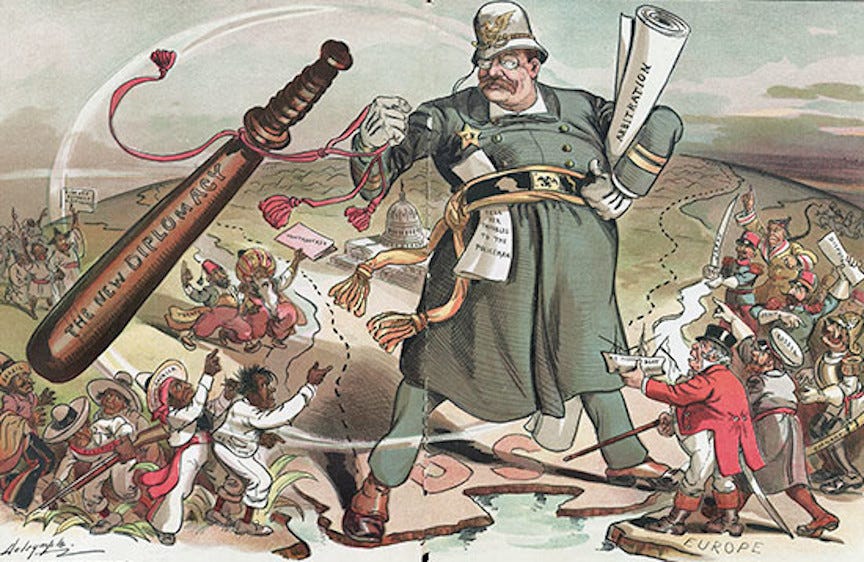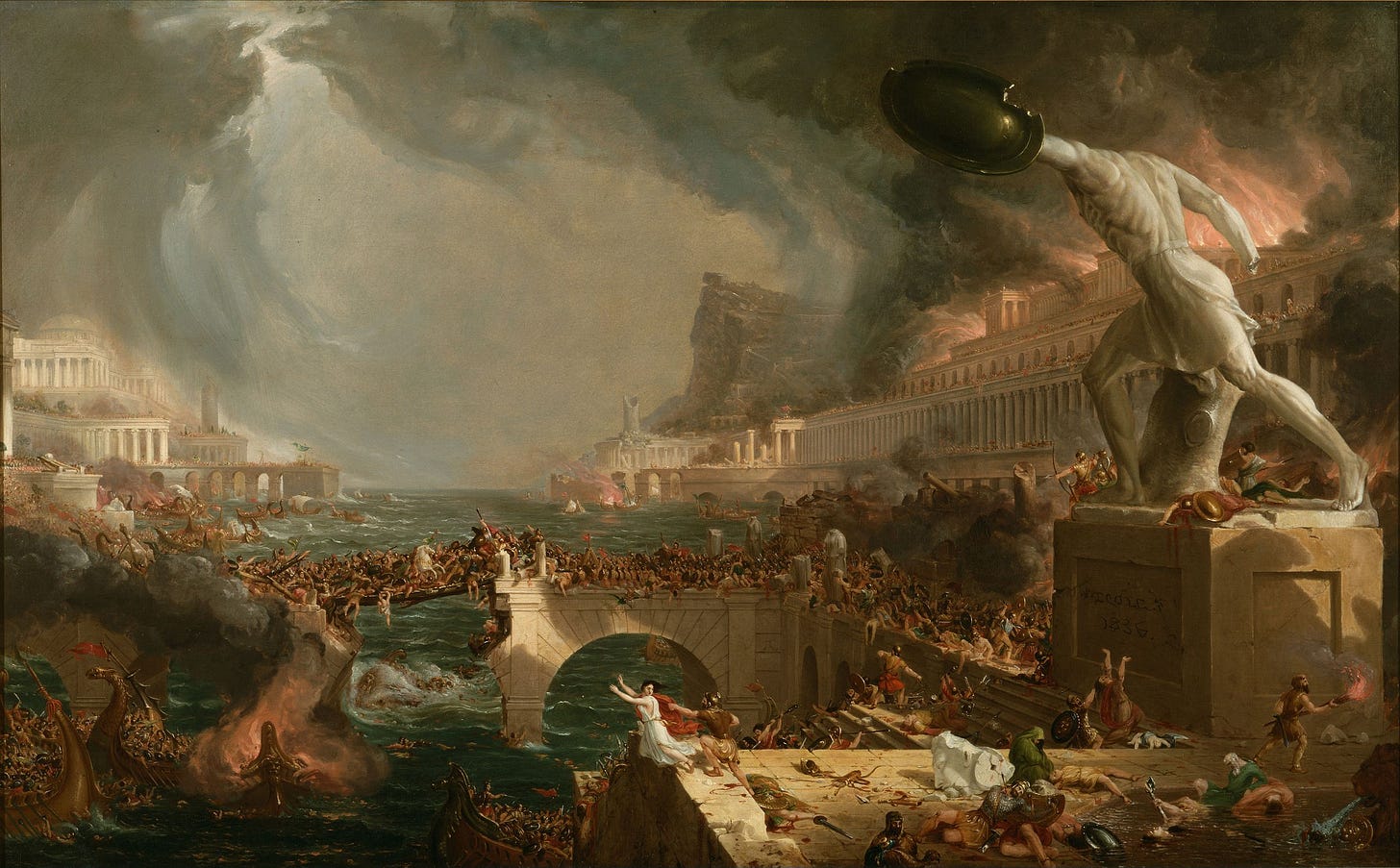The U.S. is a historical empire in advanced decline: why is it so hard to admit this?
Did Rome, Imperial Russia and Britain think the laws of history did not apply to them too?
Note: on August 26, 2021, I’ll be giving an online seminar called American West: Historical Reality & Cultural Memory. Details are here.
The modern United States is an empire, and that empire is falling. From a purely historical perspective, that statement is pretty defensible, if not quite self-evident. History works a certain way. Nations and civilizations begin and thrive, and a handful of ambitious nations rise to such prominence that they can project themselves and their culture far beyond their own borders. Then these empires inevitably decay, decline and collapse. No one who has studied history can deny this. It’s happened time and time again, century after century.
Yet, as a citizen of the United States living in 2021, admitting that the laws of history that have applied to every other empire in the past also apply to us feels like heresy, or perhaps defeatism. The myth of “American exceptionalism”—that we are, fill in the blank, the world’s great hope (of what, exactly, is rarely explained), a special experiment, a nation guided by God, or somehow a positive aberration in world history—is deeply ingrained in our politics and national culture. The red-hat-wearing right-wingers who erupt in fury when they see NFL players or Olympic athletes kneeling to protest institutional racism probably don’t know it, but American exceptionalism is a key component of this reaction. A desire to protect the myth of American exceptionalism lies at the heart of recent efforts in conservative states to outlaw the teaching of honest history.
To admit America is an “empire” in the same sense as Rome was in ancient times or the British Empire was in the 19th century is distasteful to many; but to accept that premise tacitly and then admit the possibility that such an empire is in decline, and will inevitably fall, seems far worse. Recently, in drafting a presentation for business leaders that involved the rise and fall of empires in world history as an analogy to the rise and fall of fossil fuel economies in relation to climate change, I was advised to de-emphasize the “fall of empire stuff” as applied to the United States, on the ground that “Your audience will instantly tune out.” This advice is probably correct. Nobody will pay you to tell them they live in a dying empire. But this is historical reality.

The United States is an empire; I don’t believe there’s any room for doubt on that point. There are American military bases in foreign nations all over the world, from Australia to Iceland and on desolate flyspeck islands few people have ever heard of like Diego Garcia. America’s grasp for global empire in terms of military force stretches back to the 19th century, particularly when the transition of naval vessels from sail to steam made coaling stations a necessity for the maintenance of trans-oceanic navies. Theodore Roosevelt, when he was Assistant Secretary for the Navy in 1898, would not have argued that the U.S. was destined to be a world empire; but he would have told you that it was for all the right reasons, spreading democracy and Christian charity and that sort of thing. Post-1945, U.S. military power was propped up by nuclear weapons which were said, also, to be in our possession for the right reasons—because “they” (the bad guys) couldn’t get them first, or had to be balanced, or deterred, or something. We still have the largest defense budget, by far, of any nation in the world.
The soft power the American empire exercises far exceeds even its military reach. From Coca-Cola to Microsoft, smart phones to pop stars and Marvel superhero movies, the globe is saturated with the intellectual, financial and physical products of American culture. For all the brilliance of their civilization, the Romans could not get the Goths or the Carthaginians to listen to their popular music, and the British never managed to get Indians, Malaysians or Singaporeans hooked on the latest smartphones. Like the Romans’ use of roads and the British mastery of long-range ships, we Americans leveraged our empire on mastery of new technologies: automobiles, nuclear weapons, consumer goods, microchips, advertising, IT and advanced financial technologies.
Okay. So we’re an empire. Is that so bad? We could call back Monty Python sketches about “What did the Romans ever do for us?”, but if we went down this road ultimately we’d end up debating Teddy Roosevelt’s (and Rudyard Kipling’s) 1898 arguments, and then the ugly beast of American exceptionalism, again, would inevitably take a steaming dump in the middle of the conversation. “But…democracy! But…the Constitution! But…we saved the world from [fill in the blank] Hitler and Communism!” Debating the moral value of empires is an entirely ahistorical question. I do not care whether the American empire is “better” for the world than the Roman or British empires were. That’s a parlor game. I won’t play it.
The real question is, if we’re an empire, are we…*takes a big gulp*…falling? Applying the laws of history, this one seems pretty clear-cut too. Yes, we are. We could argue about the definition of what it means for an empire to “fall” or what “decline” entails, but that too is awfully parlor-gamey in this context. History provides no example of an imperial society which, once it begins its decline, snaps out of it and somehow miraculously bucks the trend. The dissolution and collapse of the American empire is inevitable. It’s begun. It’s already well advanced.
How do we know? The signs have been staring us in the face for literally decades. An empire built at least in part on projected military power will typically fight a couple of major wars against existential threats—like Rome’s wars with Carthage, Byzantium’s (the Eastern Roman Empire’s) wars against the Sassanid Persians in the 7th century CE, or Britain in World War II—but, particularly in later stages, it will often become embroiled in a series of smaller-scale conflicts on its peripheries, meant either to facilitate further expansion or to preserve its imperial power. West Rome’s wars in central Europe against principally Germanic peoples in the 1st and particularly 2nd centuries CE fit this pattern. As the British Empire transitioned from peak to decline in the late 19th century it was involved in expansionist wars in the Sahara, Africa (the Boer War, 1899-1902) and several times in Northern Ireland. The UK fought tenaciously in 1982 to hold on to its most ridiculous imperial possession, the largely worthless Falkland Islands, solely for reasons of imperial prestige. Britain’s involvement in the Iraq War of 2003 was even more cynical, an attempt to preserve the tattered remnants of great power status by proxy, that being its geopolitical relationship to the United States.
And look at the wars we have engaged in since 1945. Korea, Vietnam, Iraq (twice) and Afghanistan, with smaller-scale pin-prick interventions in Grenada, Haiti, Somalia, Libya, Syria, Yemen and various other places. What have we gained from these conflicts? Very little, except the psychological effect of being able to deny, for another Presidential administration or two, that American power is falling apart.

In their advanced stages of decline, empires tend to become irritable, reactionary and belligerent. Again, witness the silly 1982 Falklands war between Great Britain and Argentina—fought by the same leader (Margaret Thatcher) who two years later negotiated away the largest piece of the British Empire still existing at that time, Hong Kong, for eventual turnover to China. Granted, she didn’t have much choice, but was the Falklands adventure a counter-performative action that had to do with the long decline of British power? Attacked on 9/11, the United States under Bush II went somewhat half-heartedly after the attackers in Afghanistan—Bush, after all, let bin Laden escape to Pakistan and left his termination a job for his successor to finish—but Bush went with considerably more relish after Saddam Hussein, an imaginary enemy who had not attacked us but whose head (Bush thought) would look nice in a trophy case, metaphorically speaking. Now nearly 20 years after the second Iraq disaster, it’s hard to find anyone, even red-hatted MAGA cultists, willing to say that war was a good idea in retrospect. And no one talks about WMDs anymore.
Then there is our internal decline. As the example of Western Rome makes clear, falling empires tend to become obsessed with questions of the purity of their own populations and resentful of “outsiders” they blame for polluting it—in Rome’s case the Germanic peoples, “barbarians” they called them, who in the late imperial period were an increasingly larger share of citizens, landowners, military personnel and economic actors. The traditional narrative of the fall of the Western empire in 476 often paints that event as a sack by “barbarians,” not entirely accurately; Rome was sacked by Germanic armies in 410 and 457, but not in 476. In the United States, rage over immigration policy has consistently galvanized xenophobic conservatives for more than a generation. Closing borders and “building walls” was an animating impulse of the Trump cult movement but that impulse existed long before it found its ultimate voice in a racist diaper-clad reality show host.
If anything demonstrated the rapidity of internal decline within the American empire, the January 6 insurrection should have put it beyond all doubt. Here was a group of people, animated by media-fed delusion, expressly rejecting the central basis of what is supposed to be the American promise—democracy and self-determination—in favor of violent revolution to support an authoritarian dictator. The Capitol insurrection was just short of 20 years after 9/11, a major accelerating event of American imperial decline. The next insurrection will happen far sooner than that, and it will more than likely succeed. Most of the media think pieces being done about the anti-democratic right these days take a cautionary approach: “Look how close fascism is. This is our last chance to act!” But those kinds of analyses seldom engage with the historical reality, which is that an empire as far advanced down the road of external and internal decay as ours is, has never—and I do mean never—managed to arrest its own decline.

As of this year, our Constitution is 234 years old. When its age is cited it’s usually a compliment: “Look how long the American republic has endured!” The historical question that follows that one is much less rosy: what if we’re nearing, or may have even passed, the Constitution’s conceivable life span? No one wants to ask that question, because if the answer is anything other than some permutation of, “It will go on forever!”, we start to get into that uncomfortable heresy/apostasy territory where everyone will tune you out and I am left talking to an empty room, or being shouted at as a dirty Commie traitor by Twitter bots with crying eagles and American flags in their profiles.
This is where we must separate what we want from what is. Personally I believe in the promises of the Constitution, freedom and equality, even though they haven’t always (or often) been fulfilled. I wish our system had another 200 years to move closer to those ideals. Unfortunately the red hats don’t agree that democracy is a good idea anymore, regardless of how “patriotic” they claim to be. But the American republic simply can’t go on forever. It may not be able to go on for much longer.
What happens when an empire falls? The example we don’t want to emulate is Western Rome, where classical civilization essentially dissolved and most of the former Roman lands in Western Europe fell into a retrenchment of economic contraction and desperate subsistence, ultimately resulting in feudalism. A slightly better example is Britain, which lost its world-girding empire in the last half of the 20th century but is still a relatively functional place, at least compared to 5th century Europe. Then again the complete history of British decline has not yet been written, and the word “Brexit” does not yet appear in it—but it will. Imperial Russia collapsed into violent revolution, civil war, and totalitarian genocide for most of the 20th century. That example isn’t too rosy either.
The true elephant in the room here is climate change. The collapse of American empire is not happening in a vacuum. If we are (fill in the blank—5 years away?) from a radical termination, or at least significant change, in the American polity, we are 10-15 years away, at most, from the general collapse of industrial civilization due to climate change and environmental factors. This means we will be trying to pick up the pieces of our broken post-imperial society amidst a ferocious assault by sea level rise, heat waves, superstorms, emergent diseases and military conflict over refugee migration and dwindling resources. There will also be a significant relationship between American imperial collapse and what we might euphemistically call the Great Slowdown, meaning the end of growth economies on planet Earth for all time. While I do not believe human civilization will literally terminate as a result of climate change, no more so than European society terminated in 476, the process of adapting to climate change looks to me much more like 6th century Western Europe or 1920s Russia than it does like the genteel retrenchment of the British empire at the tail end of the 20th century. After our empire is gone I don’t think we’ll be sipping Earl Grey and watching The Great British Baking Show. If the American empire collapsed in, say, 1945, we might have had a few decades’ head start to figure out what to do with ourselves before the Great Slowdown hits. As it is, we don’t have any time left.

If my analysis sounds pessimistic, I suppose it is—but that’s if you define American exceptionalism, or the refusal to engage with historical precedent, as necessary components of “optimism.” Unlike the media think pieces warning about impending fascism, which seem contractually bound to end with admonitions to “protect voting rights!,” or climate change stories that use language like “last chance” or “there’s still hope” or “we must change course now” (all of which are true), I don’t have a coda that will mitigate, encapsulate, or call to action. If I lived in Rome in 466 and happened to know that my empire would fall in ten years’ time, I’m not sure what else I would do other than to set my affairs in order to prepare in reasonable fashion for any eventuality. Just as American exceptionalism is not the exemption from the laws of history that patriotic politicians think it is, sober understanding of the trajectory of our society confers no magic benefit either.
But isn’t talking about it, and thinking about it, at least worth the exercise? I could not have stopped the fall of Western Rome in 476 or the Russian Revolution of 1917 even if I had known precisely the circumstances of their coming. I can’t stop the collapse of American empire either. But I do believe we owe this world-historical event some sober and reasoned contemplation, if only because self-honesty seems a little bit more mature than self-delusion.
Thanks for reading.
☕ If you enjoy what I do, buy me a virtual coffee from time-to-time to support my work. I know it seems small, but it truly helps.
🎓 Like learning? Find out what courses I’m currently offering at my website.
📽 More the visual type? Here is my YouTube channel with tons of free history videos.
💌 Feedback to share or want to say hello? Hit reply on this email or leave me a comment on Substack.




